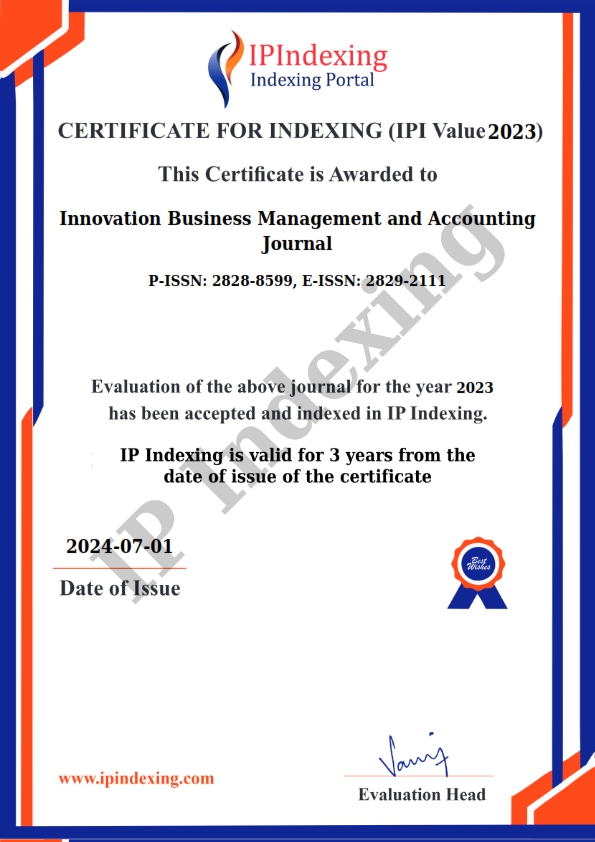The Influence of Workload and Leadership Style on Employee Performance
DOI:
https://doi.org/10.56070/ibmaj.2025.030Keywords:
Employee Perfomance, Leadership Style, Organizational Commitment, WorkloadAbstract
This research is motivated by the problem of the performance of DPRD Secretariat employees which is considered less than optimal. The purpose of this study is to analyse the effect of workload and leadership style on organizational commitment and its impact on employee performance. The approach used is quantitative with the Structural Equation Modelling-Partial Least Square (SEM-PLS) method. The population of this study was all DPRD Secretariat employees, with a sample of 80 people taken through saturated sampling techniques. The results of the study indicate that workload has a significant effect on organizational commitment, indicating that good workload management can increase employee loyalty. In addition, leadership style also has a significant effect on organizational commitment, where an inspiring and supportive leadership style can strengthen employee engagement. Workload and leadership style have been shown to have a significant effect on performance, indicating that appropriate workload and effective leadership can increase employee productivity and work results. Organizational commitment also has a significant effect on performance, where employees with high commitment show greater dedication. In addition, organizational commitment mediates the effect of workload and leadership style on employee performance. This study emphasizes the importance of workload management, the application of appropriate leadership styles, and strengthening organizational commitment in efforts to improve the performance of DPRD Secretariat employees.
Downloads
References
Astuti, D. (2022). Pengaruh komitmen organisasi dan budaya organisasi terhadap kinerja pegawai. Jurnal Akuntansi Dan Manajemen Bisnis, 2(2), 55-68.
Colquitt, J. A., & Zipay, K. P. (2015). Justice, fairness, and employee reactions. Annu. Rev. Organ. Psychol. Organ. Behav., 2(1), 75-99.
Dessler, G. (2017). Human Resource Management. Pearson Education.
El-Ghalayini, Y. (2017). Human resource management practices and organizational performance in public sector organization. Journal of Business Studies Quarterly, 8(3), 65.
Farida, S. I., & Fauzi, M. M. (2020). Pengaruh Gaya Kepemimpinan Terhadap Kinerja Karyawan Pada Pt Sarimelati Kencana Pizza Hut Delivery Cabang Ciputat. Jurnal Al Azhar Indonesia Seri Ilmu Sosial, 1(2), 63-73.
Gunawan, I. (2022). Metode Penelitian Kualitatif: teori dan praktik. Bumi Aksara.
Judge, T. A., & Robbins, S. P. (2017). Essentials of organizational behavior (Vol. 3). Pearson Education (us).
Luthans, F., & Youssef-Morgan, C. M. (2017). Psychological capital: An evidence-based positive approach. Annual review of organizational psychology and organizational behavior, 4(1), 339-366.
Mathis, & Jackson. (2015). Manajemen Sumber Daya Manusia (Edisi 9). Salemba Empat.
Nazir, M. (2011). Metode Penelitian. Ghalia Indonesia.
Noe, R. A., Hollenbeck, J. R., Gerhart, B., & Wright, P. M. (2020). Fundamentals of Human Resource Management (8th ed.). McGraw-Hill Education.
Priyandi, R., Ginting, P., & Absah, Y. (2020). The Effect of Work Load, Discipline and Employee Income of Employees on Aparature Performance Civil Country through Work Satisfaction as an Intervening Variable on Medan Education Department. International Journal of Research and Review, 7(1), 372-383.
Santoso, S., & Tjiptono, F. (2002). Riset Pemasaran: Konsep dan aplikasinya dengan SPSS. PT Elex Media Computindo Kelompok Gramedia.
Sugiyono, P. (2022). Metode penelitian kuantitatif, kualitatif, dan R&D. CV Alfabeta.
Sugiyono. (2012). Metode Penelitian Pendidikan: Pendekatan Kuantitatif, Kualitatif, dan R&D. Alfabeta.
Sugiyono. (2013). Metode Penelitian Kuantitatif, Kualitatif dan Kombinasi (Mixed Methods). Alfabeta.
Sulastri, & Onsardi. (2020). Pengaruh Stres Kerja, dan Beban Kerja, terhadap Kinerja Karyawan. Journal of Management and Bussines (JOMB), 2(1), 83-98. doi:10.31539/jomb.v2i1.1215.
Downloads
Published
How to Cite
Issue
Section
License
Copyright (c) 2025 Faradini Filiyan, Agustin Hari Prastyowati, Muhaimin Dimyati

This work is licensed under a Creative Commons Attribution-ShareAlike 4.0 International License.



